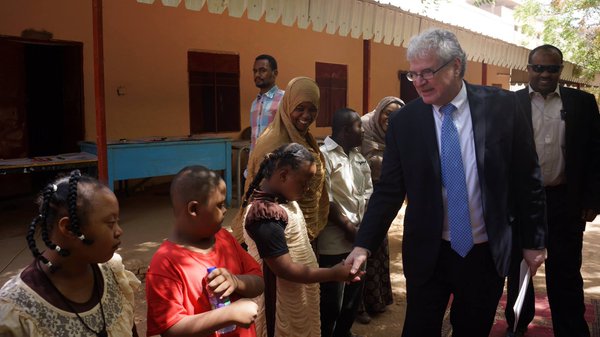Trump administration is supportive of “advancing” relationship with Sudan: envoy

May 25, 2017 (KHARTOUM) – U.S. President Donald Trump’s administration is supportive to the improvement of bilateral relations with the Sudan, said the U.S. Chargé d’Affaires Steven Koutsis in a speech about the lift of economic sanctions he made in Khartoum on Thursday.
The American diplomat was speaking in a forum on the economic sanctions held in Khartoum attended by Sudanese officials and Tarek Fahmy the Acting Director in the U.S. Department of State’s Bureau of Economic and Business Affairs, Office of Sanctions Policy and Implementation.
Koutsis told the meeting that they understand the eagerness of American and Sudanese companies to know about the definitive left of sanctions on Sudan, adding that the U.S. embassy in Khartoum received a number of calls about the issue since last January when President Obama announced the ease of sanctions.
“I know you are all wondering what will happen in July.I honestly do not know which way the decision will go, but I can say that the report that U.S. Secretary of State Tillerson will provide to President Trump on whether the Government of Sudan has sustained positive actions under our engagement will be credible and fact-based,” he said.
“So, the July report and recommendation on whether to permanently revoke the two executive orders will be based on the actions of the Government of Sudan into July. I can assure you that the Trump Administration remains supportive of our engagement and our goals for advancing our bilateral relationship,” he further stressed.
On 13 January before to leave his office, former President Obama decide to lift a 20-year trade embargo, unfreeze assets and remove financial sanctions on Sudan. He said the decision comes in response to Khartoum’s cooperation in the counterterrorism and the end of military bombardments on civilians areas in the western Sudan.
However, he delayed the lifting of the sanctions by 180 days to encourage Sudan to take further actions to improve humanitarian access to the conflict-affected areas, negotiate peace with the armed groups and improving human rights.
Khartoum has worked to improve humanitarian access particularly in Darfur region, but no agreement was reached with the SPLM-N on the humanitarian access in the South Kordofan and Blue Nile. The government and the rebels accuse each other of obstructing the deal. Also, Washington has made a proposal break the stalemate but it was rejected by the armed group.
However, Khartoum and the SPLM-N continues to observe a cessation of hostilities in the Two Areas. The cessation of hostilities is also implemented in Darfur region despite the continuation of low-intensity clashes with Sudan Liberation Movement- Abdel Wahid (SLM-AW).
Sudanese officials were very optimistic about the partial lift of sanctions but they stopped speaking about it following the American veto of President Omer al-Bashir’s participation in the recent American Islamic summit in Riyadh.
Also, Congressmen and activists call to delay the definitive revocation for additional six months to improve human rights and democratic reforms.
However, others who are favourable for the move say the ease of sanctions is just “an opening to a more serious and intensive dialogue” adding that the remaining sanctions on Sudan can be used to bring Khartoum to end the war and adopt reforms.
Also, it is purported that the CIA and the FBI have already signed cooperation agreements with Sudanese security apparatuses and bush together with the State Department for the definitive revocation insisting on the need to enhance their presence in Sudan and the region.
(ST)
